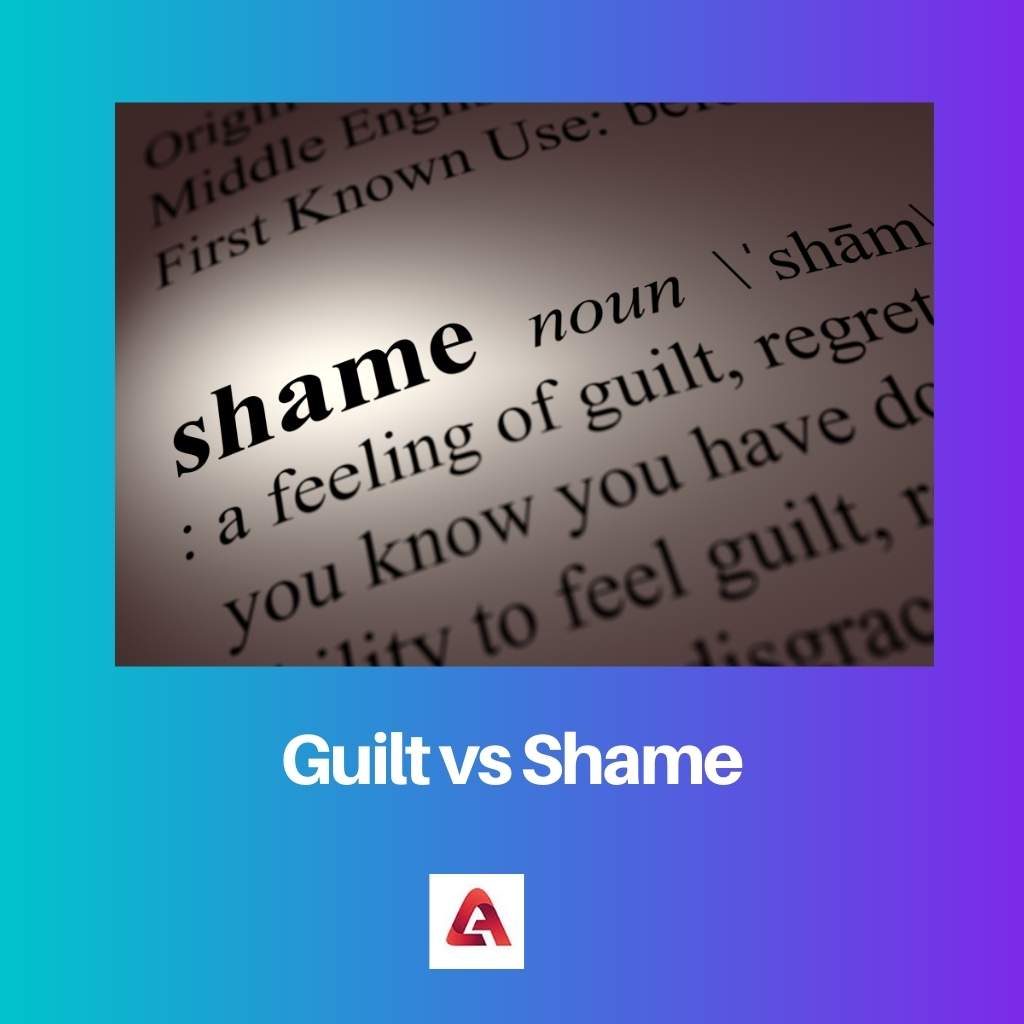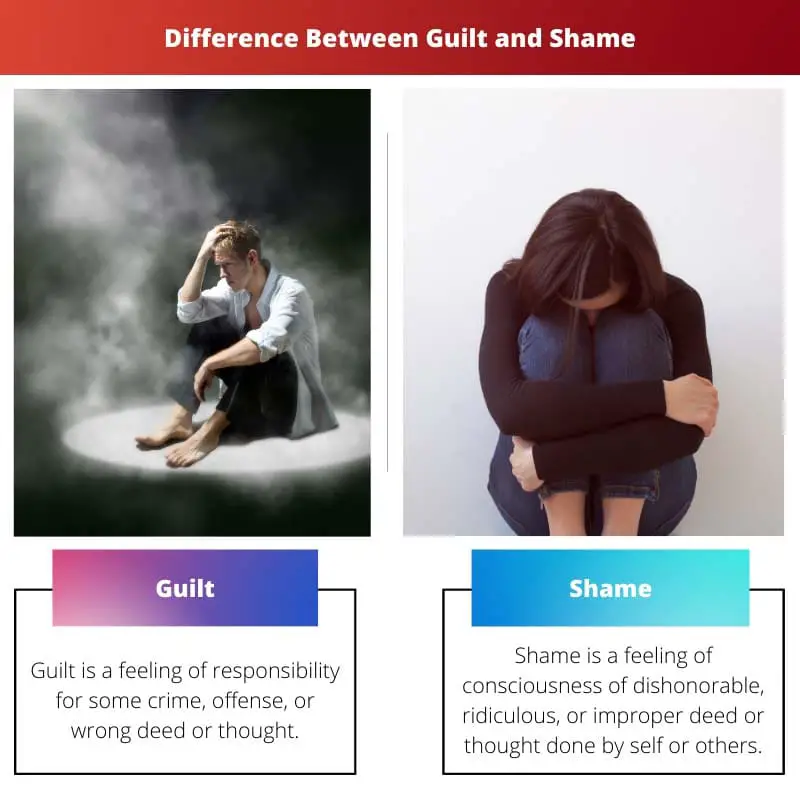There are various terms in psychology that have distinct differences but seem synonymous in everyday use. Human shortcomings can bring about various emotions.
Two such closely related emotions are guilt and shame. Both words are used interchangeably but have different meanings in a psychological context.
Key Takeaways
- Guilt is feeling remorse or responsibility for a specific action or behavior, while shame is feeling inadequacy or unworthiness.
- Guilt is focused on behavior, while shame is focused on the self.
- Guilt can be a positive emotion that leads to self-improvement, while shame can be a negative emotion that leads to self-doubt and self-criticism.
Guilt vs Shame
The difference between guilt and shame is that guilt is a negative emotion that creates an evaluation of others’ behavior while shame is a negative emotion that creates an evaluation of the self. People who experience guilt have a common behavior pattern of repair and rebuilding, while people who experience shame have a behavior pattern of avoiding or attacking.

Guilt is a particular sense of transgression. Guilt leads to repetitive thoughts of an incident.
Guilty people take responsibility for the deed, thought, or action and try to repair the damage or harm that may have been caused. Guilt promotes empathy and helps to manage anger.
On the other hand, shame is a specific feeling of inadequacy and low self-esteem. Shame brings self-consciousness.
Shameful people try to blame others for their thoughts; some people even tend to escape the situation, which may induce shame. Shame promotes hostility, aggression, and even anger.
Comparison Table
| Parameters of Comparison | Guilt | Shame |
|---|---|---|
| Definition | Guilt is a feeling of responsibility for some crime, offense, or wrong deed or thought. | Shame is a feeling of consciousness of dishonorable, ridiculous, or improper deed or thought done by self or others. |
| Generation of feeling | It generates feelings like remorse or responsible | It generates feelings like inadequacy, worthlessness, self-contempt, or low self-identity |
| Reaction or behavior | Repair and rebuild | Avoid and attack |
| Relation | Others (someone else) | Self |
| Affects | Guilt can bring depressive disorders and bipolar disorders | Shame can bring high blood pressure, suicidal behavior, and self-injury |
What is Guilt?
Guilt is an emotion that involves the belief or realization of not doing something accurately or compromising on the standards of conduct.
Guilt can also be associated with the violation of moral standards and bearing the responsibility for those violations significantly.
Guilt is closely related to remorse and regret. Guilt plays a vital role in determining obsessive-compulsive disorders.
Guilt brings conflict in thoughts and is a disturbing emotion. The constant thought of what one should not have done or should have done brings an affective state.
Guilt is a strong emotion. It can be self-focused but is highly socially relevant.
Guilt promotes active reflection on actions or thoughts. Constant thoughts of guilt are also known as “guilt trips.”
Though guilt is called disturbing and destructive and is considered a negative feeling, it can also act as a strong motivation to correct, apologize or make up for a wrong done.
It prevents further mistakes or harm and preserves social bonds. Some scholars also believe that guilt can promote empathy and trustworthiness.
Excessive or inappropriate guilt can become a cause of several depressive disorders and bipolar disorders.
Any minor failure that stems from a deed or action which is beyond the control of someone can cause repeated thoughts and cause guilt.
Several therapies and treatments can help people address intense guilt and find mental peace.

What is Shame?
Shame is an emotion that involves self-consciousness that is unpleasant and a constant negative evaluation of self.
Feelings like mistrust, distress, powerlessness, withdrawal of motivation, and worthlessness bring shame.
Shame is regarded as a social, basic, and discrete emotion that encourages people to deny or hide their wrongdoings.
Shame affects an individual concerning a perceived audience. Shame is a strong negative emotion that brings self-evaluation against the social context’s ideal standards.
Some researchers believe that scholars can be dysfunctional at the individual and group levels. Shame is used as a scale by psychologists to assess emotional states.
Behavior patterns that can uncover or expose something or someone can bring shame. Shame brings a sense of restraint against offending others.
Charles Darwin was the first scientist to describe shame as an affecting parameter of forms like blushing, lowering of the head, slacking posture, confusion of mind, or even downward cast of eyes.
He even published a book called “The Expression of the Emotions in Man and Animals” to describe the observations vividly.
Shame brings the entire focus on self and identity. Shame can act as a self-punishing thought. Shame brings active acknowledgment of some action that could have gone wrong.
Shame shares a deep connection with the mechanism of denial. Shame is considered synonymous with embarrassment, disgrace, humiliation, dishonor, inadequacy, and even chagrin.

Main Differences Between Guilt and Shame
- Guilt reflects on the actions that may have injured or harmed others, while shame reflects how one feels about themselves.
- Guilt is synonymous with remorse and regret, while shame is synonymous with embarrassment, disgrace, humiliation, dishonor, inadequacy, and even chagrin.
- Guilt is a particular sense of transgression, while shame is a common feeling of inadequacy.
- People who experience guilt take responsibility for their actions and try to repair the damage done while people who experience shame try to blame others or hide and deny the feeling.
- The negative evaluation of guilt is of self, while shame is of others’ behavior or actions.




